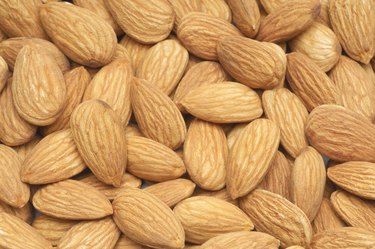
Although almond butter is made from almonds, there are several nutritional differences between the two food products. Almond butter typically contains a number of added ingredients, including oil to improve texture and consistency, which alters the nutrition. However, the nutritional differences between almonds and almond butter are small, and unless you have strict dietary restrictions, such differences are insignificant. Check nutrition facts when available, as such characteristics may vary between brands.
Calories
Video of the Day
The calorie content of almonds and almond butter varies slightly. A 1-oz. serving of almonds provides 170 calories, while a 2-tbsp. serving of almond butter provides 190 calories. The difference between these servings is 20 calories, or just 1 percent of your total daily calories, based on a 2,000-calorie diet. You could burn off 20 calories with just 6 minutes of weightlifting, according to MayoClinic.com.
Video of the Day
Fat Content
Almond butter is higher in fat, as it typically contains added oil to ensure a smooth consistency. A 1-oz. serving of almonds provides 15 g of fat, while 2 tbsp. of almond butter provides 18 g of fat. Both foods contain just 1 g of saturated fat. Despite the high fat content of almonds, research from the November 2003 issue of the "International Journal of Obesity and Related Metabolic Disorders" suggests that they can be more effective for weight loss than complex carbohydrates.
Carbohydrate Content
Almonds and almond butter are low in carbohydrates. Almonds are slightly lower in carbohydrates than almond butter, with 5 g per serving, compared to 6 g in almond butter. Both almonds and almond butter provide 3 g of fiber per serving, while almond butter contains 2 g of sugar, compared to 1 g of sugar in a serving of almonds. The low carbohydrate content of almonds and almond butter may make them appropriate for low-carbohydrate diets, if consumed in controlled quantities.
Protein Content
Almond butter is richer in protein than almonds. A 2-tbsp. serving of almond butter contains 8 g of protein, while a 1-oz. serving of almonds provides 6 g of protein. The protein content of almond butter may aid in weight loss; research from the May 2004 issue of the "Journal of the American College of Nutrition" suggests that high-protein diets promote increased satiety and calorie burning than lower protein diets.
- LIVESTRONG.COM MyPlate: Calories in Almonds
- LIVESTRONG.COM MyPlate: Calories in Almond Butter (Trader Joe's)
- MayoClinic.com; Exercise for Weight Loss: Calories Burned in 1 Hour; December 2009
- "International Journal of Obesity and Related Metabolic Disorders"; Almonds vs. Complex Carbohydrates in a Weight Reduction Program; M.A. Wien et al.; November 2003